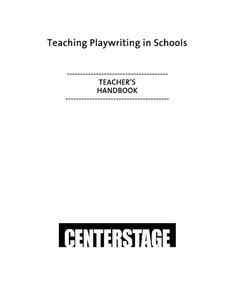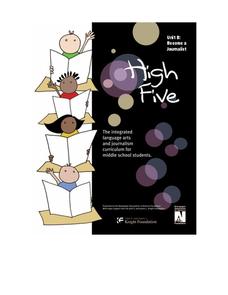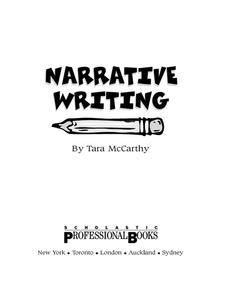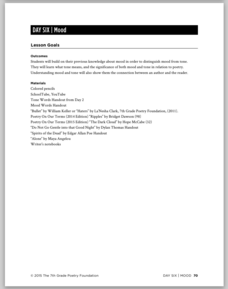American Press Institute
Introductory News Literacy
Aspiring journalists learn about media literacy, journalism, and the press. Units come complete with handouts, assignment rubrics, notes, and extension suggestions. Each unit also comes with a list of vocabulary words and learning...
Learning to Give
Teaching Playwriting in Schools
The world is a stage, and so is your classroom! Hone the skills of the next generation of Tony® award winners with a set of exercises, reference pages, writing prompts, and excerpts from famous plays.
Curated OER
Writing a Screenplay
It's time to make a movie! Kids follow 15 steps to take their movie ideas from concept to script, following clear examples. The resource includes creative ways to guide learners into developing a few words and concepts into fully...
Online Publications
Become a Journalist
Explore the newspaper as a unique entity with a detailed and extended unit. The unit requires learners to consider the newspaper's role in democracy, think about ethics, practice writing and interviewing, and examine advertising and news...
Scholastic
Narrative Writing
If you're looking to start a unit based around narrative writing, make sure to consider this resource while you're planning. This book covers five topics: writing personal narratives, writing narratives about others, writing...
We are Teachers
Phrases to Outlaw in Students' Writing
If your writing classroom was the Wild West, what phrases would be "outlawed"? Here is one poster that every writing instructor, and really, any teacher of communication, should have in their classroom!
Curated OER
Using Google Docs
This is a fantastic resource for teachers to have in their tool belts upon entering into the world of using Google Docs in the classroom! It is a reference sheet with step-by-step instructions and graphics for everything from basic...
Scholastic
Writing to a Historical Poet
Poetry is a very personal and introspective art form. Give your class the opportunity to understand how a poet's voice can speak to them on a personal level, and that every reader can respond to an author differently. After a poetic...
Core Knowledge Foundation
Unit 3: Strange Case of Dr. Jekyll and Mr. Hyde by Robert Louis Stevenson Teacher Guide
The Core Knowledge Foundation offers this teacher guide to Robert Louis Stevenson's gothic novel about the duality of humankind. The 128-page guide includes a unit introduction, unit calendar, nine scripted lesson plans, assessments with...
Curated OER
Mood
Young scholars learn how to distinguish between the mood of a piece of writing (how the work makes the reader feel) and the tone (the writer's attitude toward the material) in the sixth lesson in a poetry unit. After watching two very...
Curated OER
Revision
Young poets learn the value of using a thesaurus when crafting and revising poems. They examine poems rich in figurative language and then a revised version with the figurative language removed. To demonstrate what they have learned,...
Core Knowledge Foundation
Unit 8: Code Talker by Joseph Bruchac Teacher Guide
Joseph Bruchac's Code Talker tells the remarkable story of Navajo Marines' role in battles of the Pacific Theater during World War II. As scholars read the novel, they also engage in activities that expand their knowledge of Navajo...
Core Knowledge Foundation
Unit 7: Anne Frank’s Tales from the Secret Annex Teacher Guide
Frequently banned, often challenged, a mainstay of middle school curriculum, Tales from the Secret Annex, is the featured text in the seventh unit in the Teacher Guide Core Knowledge Program. The 134-page guide includes an...
Core Knowledge Foundation
Unit 6: The Genius of the Harlem Renaissance Teacher Guide
Introduce your seventh graders to the Harlem Renaissance with a unit that explores this dynamic period's music, literature, and ideas. The 160-page guide includes a unit calendar, an introduction to the unit, 10 richly detailed lessons...
Core Knowledge Foundation
Unit 5: Realms of Gold - Vol. 2 Poetry and Short Stories Teacher Guide
Seventh graders have a golden opportunity to learn how to read poems and short stories with a unit that introduces them to the techniques writers use to craft their works. They examine poems by William Carlos Williams and Edgar Allen Poe...
Core Knowledge Foundation
Unit 4: The Time Machine by H. G. Wells Teacher Guide
Lead your readers into the fourth dimension as time travelers with a Core Knowledge Language Arts (CKLA) Teacher Guide of H. G. Wells's The Time Machine. The 144-page guide includes a unit calendar, introduction, nine lessons, teacher...
Core Knowledge Foundation
Unit 2: The Tempest by William Shakespeare Teacher Guide
Massive storms, shipwrecks, survivors stranded on an island ruled by an aging magician, and strange creatures—Shakespeare's The Tempest appeals to today's middle schoolers. For this unit, seventh graders read selections from an...
Core Knowledge Foundation
Unit 1: Hello, Universe by Erin Entrada Kelly Teacher Guide
Erin Entrada Kelly's award-winning novel, Hello, Universe is the anchor text in this 236-page teacher guide. The guide includes introductions to the Core Knowledge Language Arts (CKLA) program and the unit, a unit...
K20 LEARN
A Way With Words: Copy Editing And The Writing Process
Learning to edit copy using correct grammar and mechanics is an essential skill in school—where scholars are called upon to edit their peers' writing—and in business. Class members practice this skill by first editing a provided article...
Angel Island Immigration Station Foundation
Making Your Mark: Free Verse Poetry
Using the insight they have gained into the experiences of detainees at the Angel Island Immigration Station, young poets create their own free verse poems that they feel captures what it may have felt like to be an immigrant interned on...
Teaching Tolerance
In Our Own Words: A Story Book with a Purpose
Academics turn into storytellers in an engaging activity on activism. The activity focuses on promoting social change in local communities with stories. Young historians plan a storybook to target a specific audience and social issue and...
EngageNY
End of Unit Assessment, Part 1: Revising Claims and Evidence based on Feedback
What to do with all that feedback? Scholars use colored writing instruments to circle any feedback that relates to the first two rows of the grading rubric. After working on revisions for their papers, learners view the performance task...
EngageNY
Final Performance Task: Sharing Visual Representations of Position Papers
Let's take a stroll! Scholars go on a gallery walk to view the visual representations for the performance task created by the class. They then view a variety of books about environment and sustainability and conduct book talks on the...
EngageNY
Finishing the End of Unit 3 Assessment: Final Draft of Position Paper and Reflection on the Writing Process
Scholars work on the end of the unit assessment by reflecting on their writing. They answer questions about the process they used to complete their position paper essays. After completing the end of unit assessment, they add images to...

























